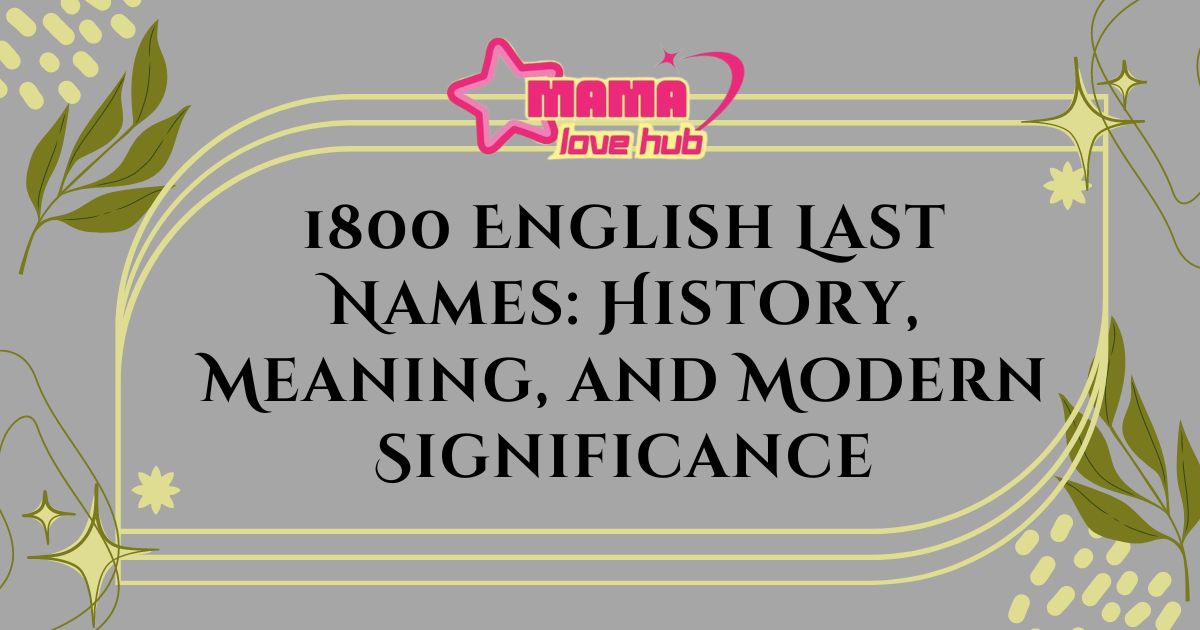1800 English Last Names: History, Meaning, and Modern Significance
Introduction
English last names hold a significant place in our personal identities and cultural heritage. They often provide clues about our ancestry, profession, or the geographical origins of our forebears. Delving into the rich tapestry of English surnames not only uncovers fascinating stories but also helps us understand how these names have evolved and persisted over the centuries.

The Evolution of English Last Names
English last names have a history that dates back over a millennium. Their origins can be traced to the Anglo-Saxon period, where people were typically identified by a single given name. However, as populations grew, the need for more specific identifiers became apparent. The Norman Conquest of 1066 played a pivotal role in shaping English surnames, introducing new naming conventions and influences from Norman French.
Over the centuries, English last names have evolved, reflecting changes in language, culture, and society. For example, during the medieval period, surnames often derived from a person’s occupation, place of residence, physical characteristics, or even personal traits.
Understanding the Structure of English Last Names
To appreciate the diversity of English last names, it’s essential to understand their various structures:
Patronymic surnames are derived from the father’s first name, often with the addition of “son” (e.g., Johnson, meaning “son of John”). Matronymic names, though less common, are derived from the mother’s name.
Occupational Surnames
Many English surnames originated from the occupations of their bearers. Examples include Smith (a worker in metal), Baker (a bread maker), and Fletcher (a maker of arrows).
Locational Surnames
These surnames were derived from the geographical locations where individuals lived or owned land. Examples include Hill (living near a hill), Wood (living near a wood), and London (from the city of London).
Descriptive Surnames
Descriptive surnames often originated from nicknames based on physical appearance or personality traits. Examples include Brown (for someone with brown hair or complexion) and Strong (for someone of great physical strength).
Common English Last Names and Their Meanings
Here are some of the most common English last names and their meanings:
Smith
The name Smith comes from the Old English “smitan,” meaning “to smite or strike.” It was commonly used for metal workers.
Johnson
Derived from the given name John, Johnson means “son of John.”
Williams
Williams is derived from the given name William, meaning “resolute protector.”
Brown
Brown is a descriptive surname referring to someone with brown hair or skin.
Taylor
Taylor is an occupational surname derived from the Old French word “tailleur,” meaning “tailor.”
Unique and Uncommon English Last Names
Unique and uncommon last names add a certain charm and individuality. Examples include:
Blenkinsop: From a place in Northumberland.
Featherstonehaugh: Derived from a place in Northumberland, meaning “a stone of the feather stony district.”
Molyneux: Of Norman origin, meaning “a mill or a miller.”
The Role of English Last Names in Modern Identity
In today’s world, English last names continue to play a crucial role in personal and social identity. They often carry a sense of pride and belonging, connecting individuals to their family’s history and heritage.
Famous Personalities and Their Last Names
The influence of famous personalities often increases the popularity of certain last names. For instance, the name Shakespeare is forever immortalized due to the legendary playwright William Shakespeare. Similarly, the name Churchill is synonymous with leadership and resilience, thanks to Sir Winston Churchill.
Nicknames Derived from English Last Names
English last names frequently evolve into nicknames. For example, someone with the last name Richardson might be affectionately called “Rich” or “Richie.” These nicknames often carry a personal and informal touch, reflecting the close bonds within families and communities.
Regional Variations in English Last Names
Regional variations in last names can be quite pronounced. For instance, the name “Davies” is more common in Wales, while “Smith” is ubiquitous throughout England. Migration and regional dialects have also contributed to the variations in spelling and pronunciation of surnames.
The Influence of English Last Names Globally
The global spread of English last names can be attributed to British colonization and immigration. As English settlers moved to new lands, they took their surnames with them, which were often adapted to fit local languages and customs.
Top 50 English Last Names from the 1800s
English last names from the 1800s reflect a rich tapestry of history, culture, and societal roles. These surnames often provide insight into the occupations, geographical origins, and personal characteristics of our ancestors. Here, we explore 50 common English last names from the 1800s and their meanings.

1. Smith
Meaning: Worker in metal (blacksmith)
Origin: Derived from the Old English “smitan,” meaning “to smite or strike.”
2. Johnson
Meaning: Son of John
Origin: From the given name John, which means “God is gracious.”
3. Williams
Meaning: Son of William
Origin: From the given name William, meaning “resolute protector.”
5. Taylor
Meaning: Tailor
Origin: From the Old French word “tailleur,” meaning “to cut.”
6. Davies
Meaning: Son of David
Origin: From the given name David, meaning “beloved.”
7. Wilson
Meaning: Son of Will
Origin: Derived from the given name William or Will.
8. Evans
Meaning: Son of Evan
Origin: From the Welsh name Ifan, a form of John.
9. Thomas
Meaning: Twin
Origin: From the Aramaic name Ta’oma.’
10. Roberts
Meaning: Son of Robert
Origin: From the given name Robert, meaning “bright fame.”
11. Wright
Meaning: Carpenter or builder
Origin: From the Old English word “wryhta” or “wyrhta,” meaning “worker” or “maker.”
12. Robinson
Meaning: Son of Robin
Origin: From the given name Robin, a diminutive of Robert.
13. Harris
Meaning: Son of Harry
Origin: From the given name Harry, a form of Henry, meaning “home ruler.”
14. Hall
Meaning: Dweller at or near a hall or manor
Origin: From the Old English word “heall.”
15. Green
Meaning: Dweller near the village green
Origin: Descriptive surname referring to someone who lived near a green area.
16. Adams
Meaning: Son of Adam
Origin: From the given name Adam, meaning “man” or “earth.”
17. Clarke
Meaning: Clerk or scholar
Origin: From the Latin word “clericus,” meaning “scribe” or “secretary.”
18. Turner
Meaning: Lathe worker
Origin: Occupational name for someone who worked with a lathe.
19. Hughes
Meaning: Son of Hugh
Origin: From the given name Hugh, meaning “heart” or “mind.”
20. Morgan
Meaning: Sea chief or bright sea
Origin: From the Welsh name Morcant.
21. Moore
Meaning: Dweller near a moor
Origin: From the Old English word “mor,” meaning “marsh” or “fen.”
22. King
Meaning: King or ruler
Origin: Possibly a nickname for someone who acted like a king or served a king.
23. Harrison
Meaning: Son of Harry
Origin: From the given name Harry, a form of Henry.
24. Martin
Meaning: Of Mars, warlike
Origin: From the Latin name Martinus, derived from Mars, the Roman god of war.
25. Jackson
Meaning: Son of Jack
Origin: From the given name Jack, a diminutive of John.
26. Thompson
Meaning: Son of Thomas
Origin: From the given name Thomas, meaning “twin.”
27. White
Meaning: A person with white hair or fair complexion
Origin: Descriptive surname from the Old English “hwit.”
28. Wood
Meaning: Dweller near a wood or forest
Origin: From the Old English word “wudu,” meaning “wood.”
29. Scott
Meaning: A person from Scotland
Origin: From the Old English word “Scottas,” meaning “Scots.”
30. Baker
Meaning: Baker
Origin: Occupational name from the Old English “bæcere.”
31. Davis
Meaning: Son of David
Origin: From the given name David, meaning “beloved.”
32. Murphy
Meaning: Sea warrior
Origin: From the Irish name O’Murchadha.
33. Price
Meaning: Son of Rhys
Origin: From the Welsh name Rhys, meaning “enthusiasm.”
34. Allen
Meaning: Little rock or harmony
Origin: From the Gaelic name Ailin or the Breton name Alan.
35. Collins
Meaning: Son of Colin
Origin: From the given name Colin, a diminutive of Nicholas.
36. Bennett
Meaning: Blessed
Origin: From the Latin name Benedictus.
37. Lee
Meaning: Dweller near a meadow
Origin: From the Old English word “leah,” meaning “clearing” or “meadow.”
38. Walker
Meaning: Cloth walker or fuller
Origin: Occupational name for a person who walked on damp cloth to thicken it.
39. Young
Meaning: Young person
Origin: From the Old English word “geong.”
40. Allen
Meaning: Little rock or harmony
Origin: From the Gaelic name Ailin or the Breton name Alan.
41. Mitchell
Meaning: Who is like God
Origin: From the Hebrew name Michael.
42. Carter
Meaning: Cart driver
Origin: Occupational name for someone who transported goods by cart.
43. Phillips
Meaning: Son of Philip
Origin: From the given name Philip, meaning “lover of horses.”
44. Campbell
Meaning: Crooked mouth
Origin: From the Scottish Gaelic “Caimbeul.”
45. Parker
Meaning: Park keeper
Origin: Occupational name for someone who looked after a park.
46. James
Meaning: Supplanter
Origin: From the Hebrew name Jacob.
47. Reynolds
Meaning: Counsel rule
Origin: From the Old French name Renaud.
48. Gray
Meaning: A person with gray hair
Origin: Descriptive surname from the Old English “græg.”
49. Bennett
Meaning: Blessed
Origin: From the Latin name Benedictus.
50. Richardson
Meaning: Son of Richard
Origin: From the given name Richard, meaning “strong ruler.”
Conclusion
Exploring English last names from the 1800s reveals much about the history, occupations, and characteristics of those who lived in that era. Each surname carries a unique story, reflecting the diverse and dynamic nature of English heritage. Understanding these names enriches our connection to the past and offers insight into the lives of our ancestors.
FAQs
1. What is the origin of English last names?
English last names have origins in various aspects of medieval life, including occupations, geographical locations, personal characteristics, and paternal lineage. Many surnames also derive from Old English, Latin, French, and other languages due to historical influences and migrations.
2. Why do some English last names end in “-son”?
The suffix “-son” in English last names typically indicates “son of.” For example, “Johnson” means “son of John.” This patronymic system was a common way to denote lineage and familial relationships in surnames.
3. How have English last names evolved over time?
English last names have evolved due to linguistic changes, cultural influences, and societal developments. Names were often standardized in spelling and pronunciation over time, especially with the advent of official record-keeping and census data.
4. Can English last names indicate a person’s occupation?
Yes, many English last names are derived from occupations. For example, “Smith” refers to a blacksmith, “Taylor” to a tailor, and “Baker” to a baker. These occupational surnames were common as they described the primary job of the individual or family.
5. What are some common themes in the meanings of English last names?
Common themes in the meanings of English last names include occupations (e.g., Baker, Smith), physical characteristics (e.g., Brown, White), geographical locations (e.g., Hill, Woods), and familial relationships (e.g., Johnson, Wilson). These themes provide insights into the lives and environments of our ancestors.


1 thought on “1800 English Last Names: History, Meaning, and Modern Significance”